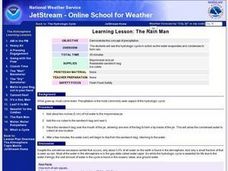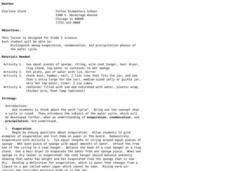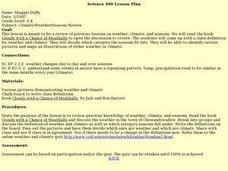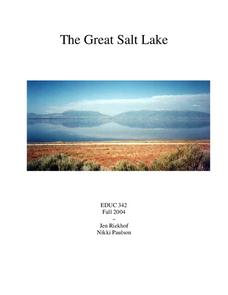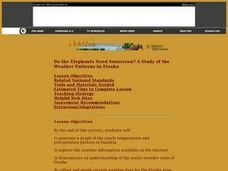Curated OER
Using Vegetation, Precipitation, and Surface Temperature to Study Climate Zones
Using NASA's Live Access Server, earth scientists compare the temperature, precipitation, and normalized difference vegetation index for four different locations. They use the data to identify the climate zone of each location using...
Scholastic
Study Jams! Severe Storms
Tornadoes and hurricanes and blizzards, oh my! Severe storms are always occurring somewhere on the planet. By reading through these slides, learners discover the characteristics of each type. Have them do this as homework and then take...
NASA
Geographical Influences
"If global warming is real, why is it so cold?" Distinguishing the difference between weather and climate is important when it comes to understanding our planet. In these activities, young scientists look at the climate patterns in a...
Curated OER
Understanding the Water Cycle
Investigate the water cycle and how water moves from the land to the air and back to the land. Create a terrarium and observe the water cycle at work. Define weather terms including evaporation, condensation, and precipitation.
Curated OER
Dry Season and 'Green' Season in Costa Rica
Learners explore the seasonal changes in Costa Rica. In this dry season lesson students use the Internet to locate science data then generate data for precipitation.
Curated OER
Cold, Clouds, and Snowflakes
Young scholars explore satellite data and graphing. For this weather data analysis math and science lesson, students analyze NASA satellite data to draw conclusions about geographical areas where precipitation might have happened. Young...
Curated OER
Worksheet 3: Earth's Climate System II
A diagram of a mountain range and the prevailing winds is shown at the top of the page. Meteorology pupils describe the weather conditions at different points on the diagram. They explain the El Nino effect and why evaporation and...
Curated OER
Water Cycle Song
Oh my! Get ready for a water cycle song. This short little song, sung to the tune of "Oh My Darling Clementine," is intended to assist young weather enthusiasts in recalling the three parts of the water cycle. Tip: Have your class group...
Curated OER
Weather Facts Internet Hunt
In this weather worksheet, students click on the links in the questions about weather to find the answers to the questions and then come back and answer the questions. Students answer 17 questions total.
K12 Reader
Extreme Weather
What is thunder? After reading a short article about extreme weather, middle schoolers must use information in the text to explain this weather phenomenon.
K12 Reader
Extreme Weather
Thunderstorms, tornados, blizzards, hurricanes. These extreme forms of weather are the focus of an article on a two-part reading comprehension instructional activity. After reading the passage, kids use information in the text to respond...
Curated OER
Learning Lesson: The Rain Man
Learners participate in a demonstration showing the concept of precipitation. They view the hydrologic cycle and identify its stages, and discuss flash flood safety at the end the instructional activity.
Curated OER
My Weather Dial
Students construct a weather dial. In this weather lesson, students examine different types of weather and design a weather dial for use during the daily math meeting.
Curated OER
Utah Weather
Fourth graders diagram the weather in Utah through the use of a glyph. In this Utah weather lesson, 4th graders create weather glyphs of different areas in the state. Students answer questions about the weather and then compare their...
Curated OER
Meet the Weather Scientist
Fourth graders collect, record and analyze data using simple weather instruments or use weather resources to comprehend weather. They comprehend that scientists are very important people in today's world. Pupils look at cloud types to...
Curated OER
Temperature and Tracking Weather
Fourth graders discuss, describe and track weather by utilizing a variety of measurable quantities as temperature, wind speed, wind direction, cloud conditions and precipitation. They assess, through experiments and practicing, how to...
Curated OER
Weather
Fifth graders study the water cycle. In this science lesson plan, 5th graders distinguish among evaporation, condensation, and precipitation phases of the water cycle.
Curated OER
Weather Watchers
Second graders discuss what weather is and list words that can be used to describe weather. In this science lesson, 2nd graders develop symbols for each type of weather and record the weather for two weeks at the same time and the same...
Curated OER
Climate Weather Seasons Review
Learners review the concepts of weather, climate, and seasons. They read and discuss a book about weather. Students collaborate on a class definition for climate and weather. They match weather to the specific season. Learners...
Curated OER
Using the Synoptic Code for the Prediction of Weather
Students interpret the synoptic code. They construct a thermoscreen with an anemometer. Students identify different types of clouds and understand and read barometric pressure. Students predict weather pattern as they apply to fronts.
Curated OER
Weather Tracking
Second graders use the internet to locate weather reports. They present data collected to the class through poster presentation. They read aloud the book Cloudy with a Chance of Meatballs by Judi Barrett and answer questions about...
Curated OER
Do the Elephants Need Sunscreen? A Study of the Weather Patterns in Etosha
Middle schoolers analyze the weather patterns in Namibia. They create a graph of the yearly temperatures and use the internet to gather information. They discuss how the weather goes in cycles in the area.
Curated OER
Weather Fun Facts
In this science worksheet, students investigate fun facts about weather by reading 25 short paragraphs about weather, storms, climate and geography. Students complete a crossword puzzle about weather.
Curated OER
Precipitation Experiment
In this precipitation experiment, learners follow the procedures to set up an experiment with hot and cold water in a jar, record their observations and write a conclusion.













